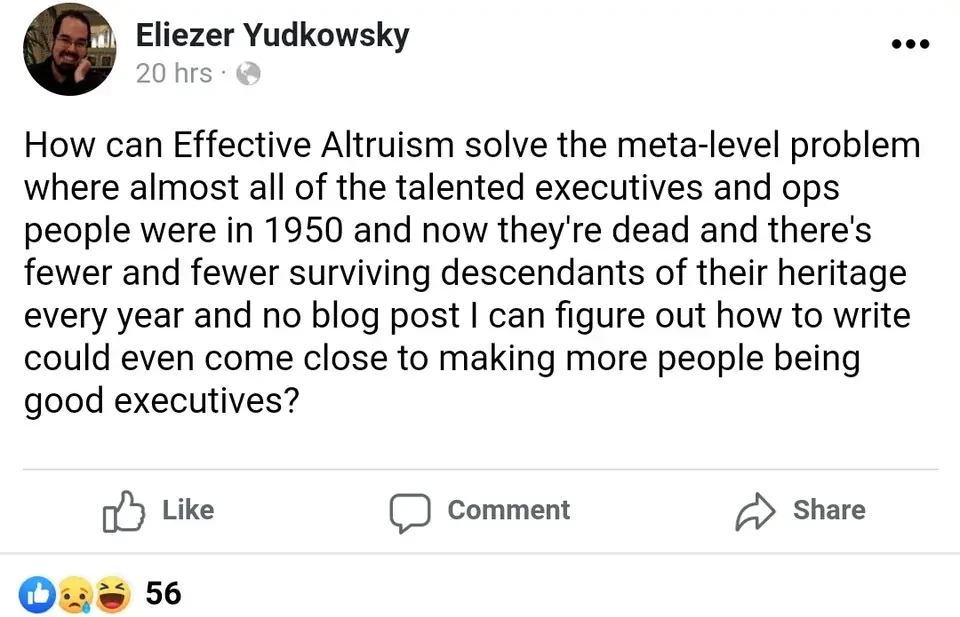"There are dozens of us! Dozens (fractional)!"
I was going to say that I had looked up Scott Aaronson in the files, and my conclusion overall was that nothing in them actually made him look worse than anyone already sees him. Joscha Bach name-dropped him as an interesting person (so what, really). Aaronson and Seth Lloyd each met with somebody who was working for Epstein (Charles Harper), at which there was some talk of making a "Cryptology in Nature" conference happen. As far as I could tell, that conference never did happen. It wasn't even evident from Harper's e-mails that Epstein had even been named at or before the meeting. I don't think Aaronson could be blamed for having a business lunch with somebody who had been a big wheel at a private foundation (Templeton, in Harper's case) and who said he could get private-foundation funding for a meeting in Aaronson's subject area.
And then Scott Aaronson had to go and write a blog post about his being in the Epstein files. Short version: He says he had lunch with Harper, after which Harper wrote him a follow-up that named Epstein "for the first time", and then he ignored Harper after hearing about Epstein's conviction. That sounds consistent with the "no real harm, no real foul" impression that I would have been willing to endorse after searching the e-mails myself. But then the epilogue! Scott comments on his own post:
I had a further thought. Back in 2019, when Epstein became a central topic of conversation following his arrest and then death, and lots of my scientific colleagues were telling stories about their contacts or near-contacts with him, it struck me that there were zero stories about any scientist—liberal or conservative, male or female, morally naive or morally astute—saying, “no, of course I want nothing to do with you, because you’re friggin’ Jeffrey Epstein, the infamous mass rapist!”
So I concluded that, if anyone now imagines that they would’ve responded that way, it’s almost certainly pure hindsight bias. Indeed, even after Epstein’s first conviction, a short jail stint in one’s past for “soliciting prostitution” simply doesn’t sound disqualifying, according to the secular liberal morality that most academics hold, unless you researched the details, which most didn’t.
Penrose and Epstein had met at a June 2017 conference on the science of consciousness in San Diego. "Although the topic [of consciousness] is not what I do, when I saw the list of speakers and was offered a plenary talk, I decided that it would be a good thing for me and a good audience to hear about my experiment," says [Ivette] Fuentes, a professor at the University of Nottingham in the United Kingdom whose work is supported by the Penrose Institute.
Shortly after returning home, Fuentes says, she and Penrose had a conversation. "Would I be interested in receiving funding from a wealthy man who had also been convicted of a sex offense?" Fuentes recalls Penrose asking her.
Fuentes immediately said no, citing ethical objections, and quickly forgot about the conversation. But 2 months ago, after reading that Epstein had been arrested, she called Penrose. "Was it Epstein?" she asked him. "And he said, ‘Yes, I think it was.' And I said, ‘Oh God.'"
I dunno, Scott. Maybe you should find better friends.
Yud:
Of course, anyone who pleads guilty to any crime is always guilty and a terrible person and no further effort is ever required to look into the matter slightly further to determine if, say, they actually did something terrible or just offended somebody in power and was forced into a plea bargain.
"In the story I just made up, Epstein was the victim. Checkmate atheists"
Yud in another comment:
If you don't like that answer, work to change laws and rebuild civilization in order to change my incentives. In dath ilan I'd have somebody who wasn't me to whom to report that sort of thing.
You do not hate this man enough.
The New York Times treats him as an expert: "Eliezer Yudkowsky, a decision theorist and an author of a forthcoming book". He's an Internet rando who has yammered about decision theory, not an actual theorist! He wrote fanfic that claimed to teach rational thinking while getting high-school biology wrong. His attempt to propose a new decision theory was, last I checked, never published in a peer-reviewed journal, and in trying to check again I discovered that it's so obscure it was deleted from Wikipedia.
https://en.wikipedia.org/wiki/Wikipedia:Articles_for_deletion/Functional_Decision_Theory
To recapitulate my sneer from an earlier thread, the New York Times respects actual decision theorists so little, it's like the whole academic discipline is trans people or something.
Hashemi and Hall (2020) published research demonstrating that convolutional neural networks could distinguish between "criminal" and "non-criminal" facial images with a reported accuracy of 97% on their test set. While this paper was later retracted for ethical concerns rather than methodological flaws,
That's not really a sentence that should begin with "While", now, is it?
it highlighted the potential for facial analysis to extend beyond physical attributes into behavior prediction.
What the fuck is wrong with you?
an hackernews:
a high correlation between intelligence and IQ
motherfuckers out here acting like "intelligence" is sufficiently well-defined that a correlation between it and anything else can be computed
intelligence can be reasonably defined as "knowledge and skills to be successful in life, i.e. have higher-than-average income"
eat a bag of dicks
shot:
The upper bound for how long to pause AI is only a century, because “farming” (artificially selecting) higher-IQ humans could probably create competent IQ 200 safety researchers.
It just takes C-sections to enable huge heads and medical science for other issues that come up.
chaser:
Indeed, the bad associations ppl have with eugenics are from scenarios much less casual than this one
going full "villain in a Venture Bros. episode who makes the Monarch feel good by comparison":
Sure, I don't think it's crazy to claim women would be lining up to screw me in that scenario
Some of Kurzweil's predictions in 1999 about 2019:
A $1,000 computing device is now approximately equal to the computational ability of the human brain. Computers are now largely invisible and are embedded everywhere. Three-dimensional virtual-reality displays, embedded in glasses and contact lenses, provide the primary interface for communication with other persons, the Web, and virtual reality. Most interaction with computing is through gestures and two-way natural-language spoken communication. Realistic all-encompassing visual, auditory, and tactile environments enable people to do virtually anything with anybody regardless of physical proximity. People are beginning to have relationships with automated personalities as companions, teachers, caretakers, and lovers.
Also:
Three‐dimensional nanotube lattices are now a prevalent form of computing circuitry.
And:
Autonomous nanoengineered machines can control their own mobility and include significant computational engines.
And:
ʺPhoneʺ calls routinely include high‐resolution three‐dimensional images projected through the direct‐eye displays and auditory lenses. Three‐dimensional holography displays have also emerged. In either case, users feel as if they are physically near the other person. The resolution equals or exceeds optimal human visual acuity. Thus a person can be fooled as to whether or not another person is physically present or is being projected through electronic communication.
And:
The all‐enveloping tactile environment is now widely available and fully convincing. Its resolution equals or exceeds that of human touch and can simulate (and stimulate) all of the facets of the tactile sense, including the sensing of pressure, temperature, textures, and moistness. Although the visual and auditory aspects of virtual reality involve only devices you have on or in your body (the direct‐eye lenses and auditory lenses), the ʺtotal touchʺ haptic environment requires entering a virtual reality booth. These technologies are popular for medical examinations, as well as sensual and sexual interactions with other human partners or simulated partners. In fact, it is often the preferred mode of interaction, even when a human partner is nearby, due to its ability to enhance both experience and safety.
And:
Automated driving systems have been found to be highly reliable and have now been installed in nearly all roads.
And:
The type of artistic and entertainment product in greatest demand (as measured by revenue generated) continues to be virtual‐experience software, which ranges from simulations of ʺrealʺ experiences to abstract environments with little or no corollary in the physical world.
And:
The expected life span, which, as a (1780 through 1900) and the first phase result of the first Industrial Revolution of the second (the twentieth century), almost doubled from less than forty, has now substantially increased again, to over one hundred.
Some of Kurzweil's predictions in 1999 about 2009:
- “Unused computes on the Internet are harvested, creating … human brain hardware capacity.”
- “The online chat rooms of the late 1990s have been replaced with virtual environments…with full visual realism.”
- “Interactive brain-generated music … is another popular genre.”
- “the underclass is politically neutralized through public assistance and the generally high level of affluence”
- “Diagnosis almost always involves collaboration between a human physician and a … expert system.”
- “Humans are generally far removed from the scene of battle.”
- “Despite occasional corrections, the ten years leading up to 2009 have seen continuous economic expansion”
- “Cables are disappearing.”
- “grammar checkers are now actually useful”
- “Intelligent roads are in use, primarily for long-distance travel.”
- “The majority of text is created using continuous speech recognition (CSR) software”
- “Autonomous nanoengineered machines … have been demonstrated and include their own computational controls.”
Carl T. Bergstrom, 13 February 2023:
Meta. OpenAI. Google.
Your AI chatbot is not hallucinating.
It's bullshitting.
It's bullshitting, because that's what you designed it to do. You designed it to generate seemingly authoritative text "with a blatant disregard for truth and logical coherence," i.e., to bullshit.
I confess myself a bit baffled by people who act like "how to interact with ChatGPT" is a useful classroom skill. It's not a word processor or a spreadsheet; it doesn't have documented, well-defined, reproducible behaviors. No, it's not remotely analogous to a calculator. Calculators are built to be right, not to sound convincing. It's a bullshit fountain. Stop acting like you're a waterbender making emotive shapes by expressing your will in the medium of liquid bullshit. The lesson one needs about a bullshit fountain is not to swim in it.
Feynman had a story about trying to read somebody's paper before a grand interdisciplinary symposium. As he told it, he couldn't get through the jargon, until he stopped and tried to translate just one sentence. He landed on a line like, "The individual member of the social community often receives information through visual, symbolic channels." And after a lot of crossing-out, he reduced that to "People read."
Yud, who idolizes Feynman above all others:
I also remark that the human equivalent of a utility function, not that we actually have one, often revolves around desires whose frustration produces pain.
Ah. People don't like to hurt.


And when our descendants build a museum to these bizarre and painful times, there will be docents of them. Docents!